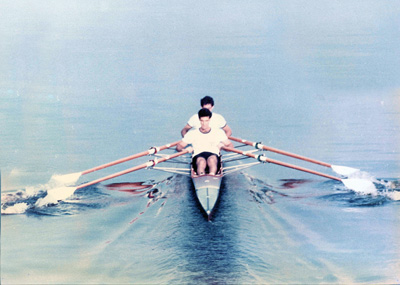Eugene Bylym: «Russian MICE: customers and agencies lack mutual understanding»
«Someone who thinks the world is always cheating him
is right. He is missing that wonderful
feeling of trust in someone or something.»
Eric Hoffer
«By mutual confidence and mutual aid —
great deeds are done, and great discoveries made»
Homer
Eugene Bylym, development director of SOLBY, the lab of effective MICE solutions, is speaking about the ways to set the course of investment growth for the «MICE ship».

Innovations and process automation are popular topics nowadays. This discussion in the sphere of business travel is caused by the rapid growth of information technologies and the market-conscious relations between customers and agencies. When it comes to MICE, technologies are still in the focus of Russian experts.
Russian business has always borrowed foreign practices, but these processes have always been considerably delayed in time. The product that appeared in mature markets some two or three years ago became a matter of argument and was adapted in Russia. The reduction of technological chains, SMMP (Strategic Meetings Management Program), integrated platforms for mutual project management — these seem to be logical and predictable procedures of process optimization, the shift to cloud services that let you keep abreast of the project 24 hours a day from all types of devices. Similar solutions are already available in other branches of economy, and there is nothing extraordinary in them that would require a hot discussion or even a dispute. All we need is to properly adapt them to MICE particularities. So technologies are discussed rather by inertia after the issue has been once raised by a group of reputed western experts.
On average, MICE project budget consists of 80% of pure logistics (accommodation, flights, conference hall rent, transport, visas, insurance of participants), i.e. refer to the business travel segment directly, but it is the other 20% that form the basis of the achievement of the event goals. No matter what you plan: to strengthen your relations with partners, to improve the brand image, to build the team and to inspire it for new achievements, to increase sales or to find solutions to important strategic issues — it is the contents and the program of the event that play the decisive role in a MICE event, and not the logistics. The Pareto rule works one hundred percent in this case: 20% of budget that account for the organizational part give 80% of effect. Event participants will not know and appreciate the fact that you have managed to book a hotel or to buy out a charter flight with a 10% discount, but they will appreciate the fascinating scenario of the trip and the single idea of your brand’s philosophy, a sudden flash mob on your way to the mountains or roses among your corporate flowers in your rooms with an inspiring message. Experience has shown, that events with the focus on team work, elaborated concept and a reasonably creative approach are far more efficient than events with the focus on logistics.
It goes about the balance that we have failed to achieve so far. Russian representatives of the customer and the agency follow trade models of business relations of the late 90-ies and the beginning of the two-thousands in their work on the project: the former are fanatic about cost cutting and cost delay, the latter — on profit maximization. Instead of team work we see a kind of a capitalistic tug of war with varied success for both parties in every case. The very 20% that account for the success of the event are often neglected, because they are not the main part of the budget from the financial point of view.
But are MICE events really costs and can they be regarded through the cost prism? Let’s make a step sideward and raise the question of the core of events like that. A MICE event is nothing else but an investment for the corporate buyer. That is investment of funds with the prospects of their growth in the future. This is the reason why typical investment terms like ROI (return on investment) are used in relation to such events by large companies. The customer expects a certain future economic return, which should of course exceed the funds invested.
Let’s take a look at a stock exchange. Imagine a situation when you have to make a choice what shares to buy. There are two variants: 1000 shares 1 dollar each and 1000 shares 1,1 dollar each. It will be cheaper to purchase the first ones. If we were focused on costs solely, we would buy the first shares, and that’s it. But what are brokers and investors guided by? By the ratio of the revenue and the risk. The first group of shares will grow by 10%, and the second — by 15%, while their risks are equal. This fact changes the situation, doesn’t it? You should buy the more expensive shares and earn more.
In case of MICE, customers make investment into participants with the help of the agency. If you make uncompromising effort to cut agency commission, the provider’s attention to the event decreases proportionally, hidden commissions appear, and in some cases the quality is affected. In such cases an event that could otherwise be called an adventure has no chance to appear. No matter how fanatic the agency team is, the finance plays its role. The agency will not put its heart into it for a scanty commission, because no people will be able to work at this level. The absence of justified margin that would satisfy the both parties leads to managers` overwork, routine offers, and economy on corporate culture. This is the reason we are now facing the flourish of MICE mass production factories that agree to almost any conditions in order to gather their portfolio. It is not surprising, that the customer does not get appropriate attention from the agency and the corresponding high results.

The cost cutting approach that came to MICE from business travel, its mother industry, has no future. If the customer cuts investment into events thus considering it as costs, he equally reduces the chance of getting revenue on it in the future. This is why customers and providers will have to find the reasonable balance between the value of commission and the desired result. Mature markets have already adopted a simple rule of customer and provider cooperation in the field of MICE: you have to pay a proportionate price for high quality. These changes will also take place in people’s minds in our country sooner or later.
In this regard the main stumbling rock of the Russian MICE market is not the staff qualification, informational technologies development, finance, lack of unity or poor organization, but the increase of culture standards and mutual respect of the parties, that are in the same boat in the process of event arrangement and should act as a team in order for the ship to take the course for investment growth.
We hope that the aim to arrange effective MICE events will eventually change the nature of relations between customers and MICE agencies and will take them to the new level of mutual respect and understanding. (solbylab.ru)
- Partners
-
Press
-
Logo ABT
-
 Download in PDF
(264Кб)
Download in PDF
(264Кб) -
 Download in EPS
(273Кб)
Download in EPS
(273Кб)
-
- Photo library
- Educational session
-
Logo ABT
- Hotels
